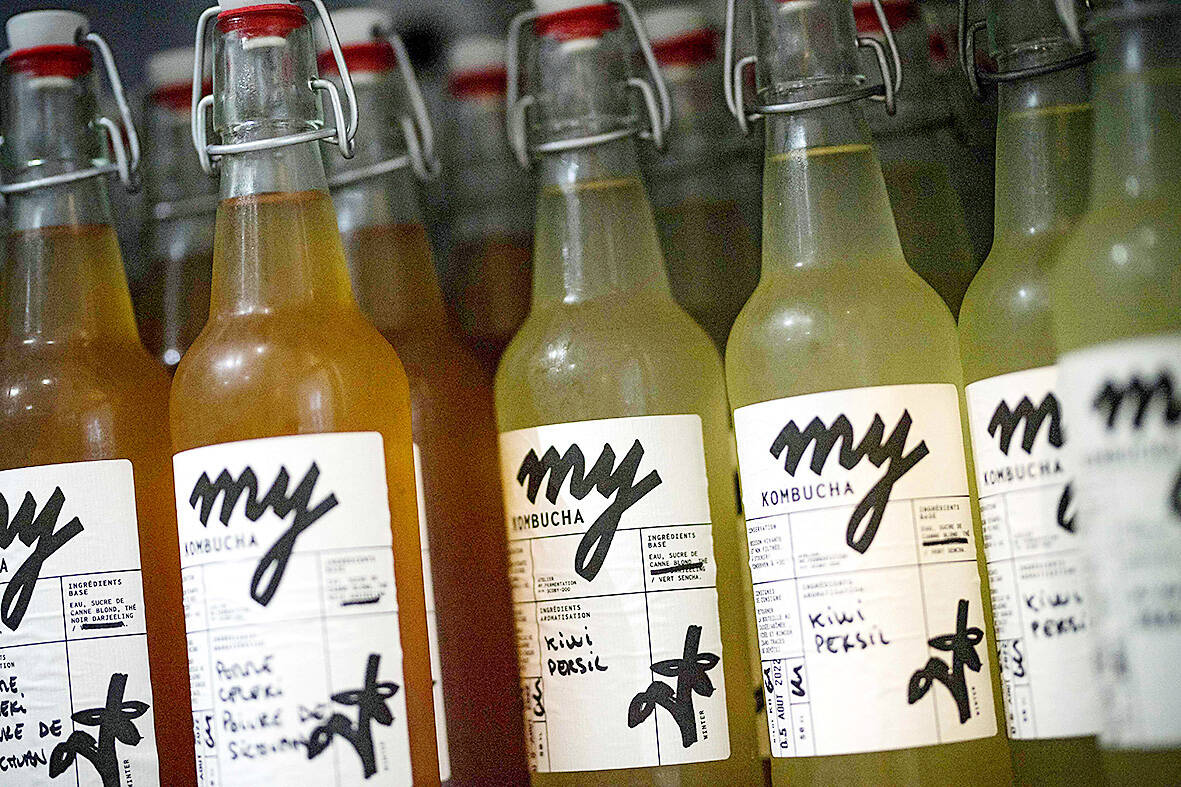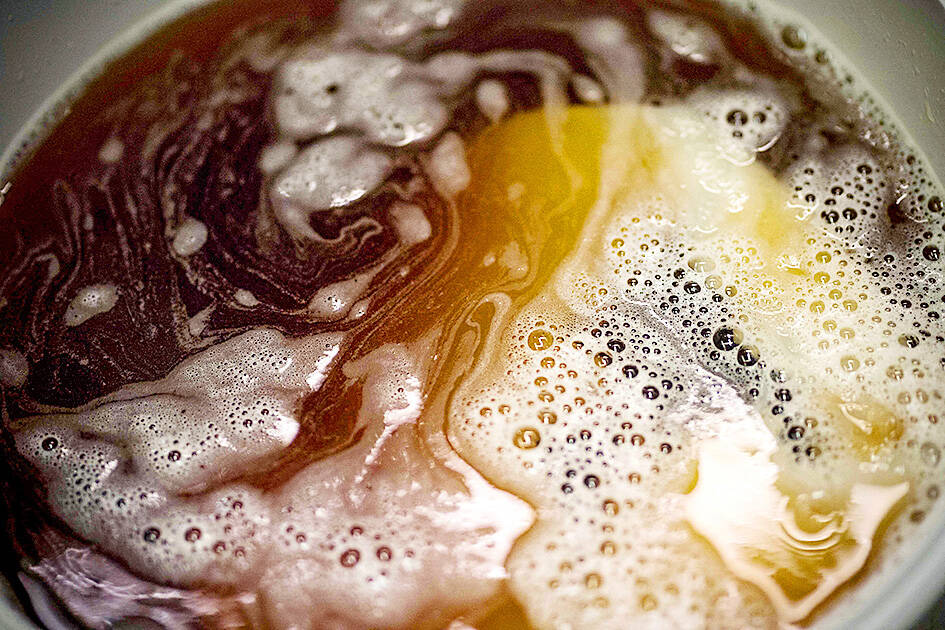Functional beverages — or drinks promoted as offering mental or physical benefits beyond hydration — are growing in popularity around the world. Hundreds of companies have jumped into the market, hoping to get some buzz with trendy and sometimes unfamiliar ingredients.
Here are some of the latest ones found in functional beverages and what scientists say about them.
ADAPTOGENS

Photo: AFP
What are they? Plants and mushrooms that may help your body respond to stress, anxiety and fatigue or enhance feelings of well-being. Examples include American and Asian ginseng (an herb), ashwagandha (an evergreen shrub), eleuthero (a shrub), Rhodiola rosea (a flowering plant) and chaga (a mushroom).
What does the science say? The Cleveland Clinic says adaptogens are known to trigger chemical reactions that can return the body to a more balanced state. Side effects from adaptogens are rare but depend on the plant. Studies show that adaptogens work best for a short duration (less than six months) because the body can build a resistance to them, making them ineffective over time.
NOOTROPICS

Photo: AFP
What are they? Also known as “smart drugs,” nootropics are substances that can improve human thinking, learning and memory. Among the most common nootropics are caffeine, L-theanine (an amino acid found in tea), creatine (an amino acid naturally found in meat and fish), Bacopa monnieri (an herb), Gingko biloba (a tree) and lion’s mane (a mushroom). Some adaptogens may also have nootropic properties, like ashwagandha.
What does the science say? In a study last year in the journal Plants, researchers said that most plant-based nootropics are not immediately effective after a single dose and must be taken for an extended period before any measurable improvement occurs. One problem in research on these natural substances has been standardizing the form they are taken in and the dosage, the study said. Side effects are rare and usually mild, but users should consider their overall health and whether nootropics could affect any other medications before ingesting them.
PROBIOTICS AND PREBIOTICS
What are they? Probiotics are foods or supplements that contain live microorganisms intended to maintain or improve the “good” bacteria in a person’s gut or other parts of the body. They are naturally found in fermented foods like yogurt, kefir, cottage cheese, kombucha and sauerkraut. Prebiotics are food for the bacteria and other organisms that live in the gut. Prebiotics can be found in whole grains, bananas, greens, onions, garlic, soybeans and artichokes.
What does the science say? The Cleveland Clinic says probiotics, in theory, work alongside the beneficial microbes in the human body to fight off harmful bacteria, fungi, viruses and parasites. Researchers know that unhealthy microbiomes can contribute to chronic diseases like irritable bowel syndrome. They may also influence mood, pain tolerance and fatigue. The Cleveland Clinic and the Mayo Clinic say there is a lot of active research into the microbiome and the impact of probiotics and prebiotics, but not enough evidence to draw solid conclusions about their effectiveness. Side effects are rare except for people with weak immune systems, whose bodies might not be able to fight off a probiotic that inadvertently contains harmful microbes.
CBD
What is it? CBD, or cannabidiol, is an active ingredient in cannabis. While it is one of hundreds of components in marijuana, CBD doesn’t cause a high by itself. CBD has been used to treat epilepsy and may also help alleviate anxiety, insomnia, chronic pain and addiction. Side effects could include nausea, fatigue and irritability.
What does the science say? In an article published in April, Harvard Medical School said CBD appears to be a helpful, relatively non-toxic option for managing anxiety and other issues. But it said more research is needed to pinpoint effective doses.

June 2 to June 8 Taiwan’s woodcutters believe that if they see even one speck of red in their cooked rice, no matter how small, an accident is going to happen. Peng Chin-tian (彭錦田) swears that this has proven to be true at every stop during his decades-long career in the logging industry. Along with mining, timber harvesting was once considered the most dangerous profession in Taiwan. Not only were mishaps common during all stages of processing, it was difficult to transport the injured to get medical treatment. Many died during the arduous journey. Peng recounts some of his accidents in

“Why does Taiwan identity decline?”a group of researchers lead by University of Nevada political scientist Austin Wang (王宏恩) asked in a recent paper. After all, it is not difficult to explain the rise in Taiwanese identity after the early 1990s. But no model predicted its decline during the 2016-2018 period, they say. After testing various alternative explanations, Wang et al argue that the fall-off in Taiwanese identity during that period is related to voter hedging based on the performance of the Democratic Progressive Party (DPP). Since the DPP is perceived as the guardian of Taiwan identity, when it performs well,

A short walk beneath the dense Amazon canopy, the forest abruptly opens up. Fallen logs are rotting, the trees grow sparser and the temperature rises in places sunlight hits the ground. This is what 24 years of severe drought looks like in the world’s largest rainforest. But this patch of degraded forest, about the size of a soccer field, is a scientific experiment. Launched in 2000 by Brazilian and British scientists, Esecaflor — short for “Forest Drought Study Project” in Portuguese — set out to simulate a future in which the changing climate could deplete the Amazon of rainfall. It is

The Taiwan People’s Party (TPP) on May 18 held a rally in Taichung to mark the anniversary of President William Lai’s (賴清德) inauguration on May 20. The title of the rally could be loosely translated to “May 18 recall fraudulent goods” (518退貨ㄌㄨㄚˋ!). Unlike in English, where the terms are the same, “recall” (退貨) in this context refers to product recalls due to damaged, defective or fraudulent merchandise, not the political recalls (罷免) currently dominating the headlines. I attended the rally to determine if the impression was correct that the TPP under party Chairman Huang Kuo-Chang (黃國昌) had little of a